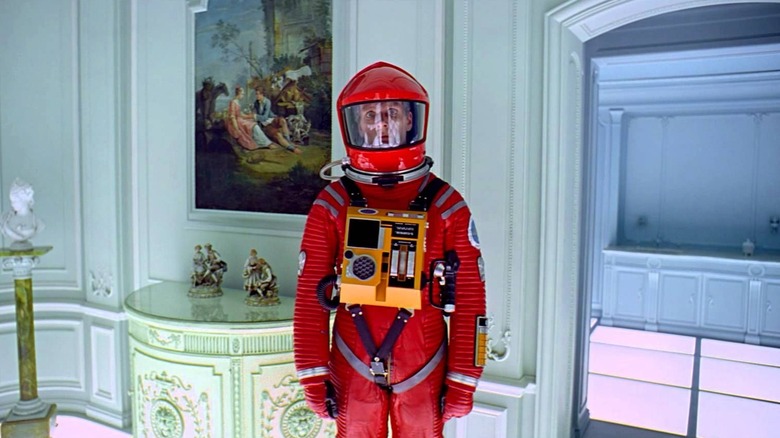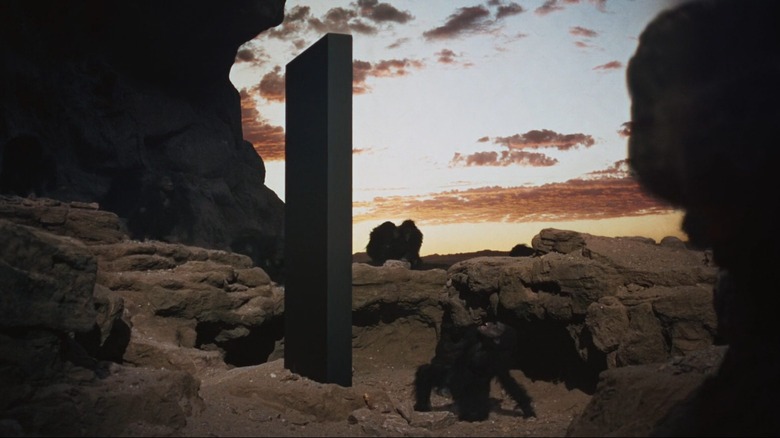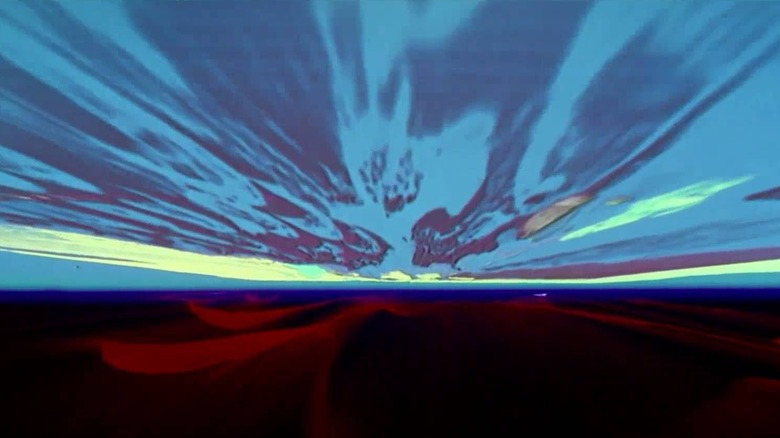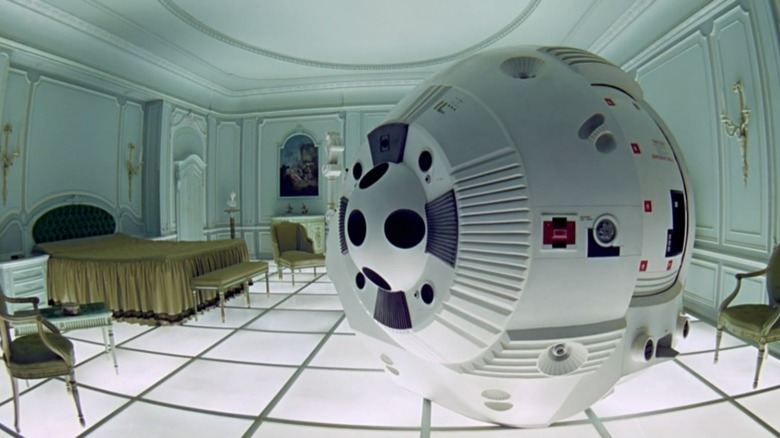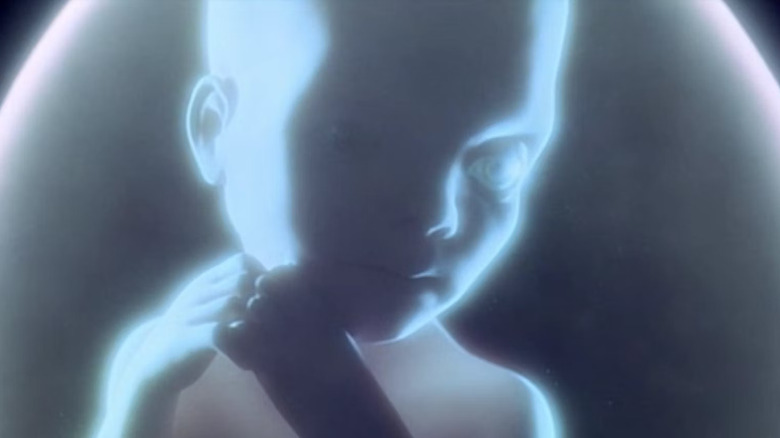The Most Confusing Moments In Stanley Kubrick's 2001: A Space Odyssey Explained
The writing process of "2001: A Space Odyssey" is the stuff of cinema legend. Stanley Kubrick wanted to make a science fiction movie about humanity's place in the universe — one that would be careful to capture the awe, mystery, and grandeur of such a meditation. He initially looked to an Arthur C. Clarke short story called "The Sentinal," but would ultimately collaborate with Clarke more directly. Their screenplay for "2001" and Clarke's novel were written simultaneously. It's hard to say if the screenplay is based on the book or if the book is a novelization of the screenplay.
"2001: A Space Odyssey" is full of cosmic mysteries and eerie iconography that may seem a little baffling at first. Why, some first-time-watching teens may ask, does the picture start in the distant, prehistoric past when humans hadn't yet evolved on Earth? What is the meaning of the strange black monoliths that appear periodically throughout the film? And what in Tartarus was the meaning of the entire "Jupiter and Beyond the Infinite" chapter that takes up the final 20 minutes of the film?
I fell in love with "2001" as a teenager, although I frequently encountered peers who openly declared the movie to be frustratingly oblique, vague, or even (umbrage!) boring. How one can look at such an intense, elevating work of art — a film that scrapes up against the infinity of space and finds humanity's place in it — and describe it as "boring" is beyond me. Or perhaps even beyond the infinite.
"2001," however, is not coy. It presents its intentions clearly and communicates its themes/moods with aplomb. Additionally, if one is armed with Clarke's book, some of the film's mysteries are explained quite directly. Come, bored teens, let us explore.
The monolith
At the beginning of "2001," a group of ape-like protohumans encounters a large black monolith in the dirt of prehistoric Earth. It is angular and smooth, qualities not commonly found in nature. Clearly, someone ... or something ... put it there. One of the hominids touches the monolith, and something happens. Shortly thereafter, the ape, poking through some tapir bones, finds that they can hold it in their hands and use it as a tool. Tool use has been observed in many animals and is generally seen as a gauge of learning and advanced cognition. The use of tools, as seen in "2001," is an evolutionary bound forward.
Of course, the use of tools is a double-edged sword — almost literally. Just as a protohuman uses a bone to hunt prey, so too will they use it to club another protohuman to death. "Tools" includes "weapons," and we are to be wary that our inventions can hurt us as much as they'll help us. It doesn't matter if it's a bone or a spacecraft; there is a light side and a dark side to everything we invent. This is why, when the hominid throws the bone into the air, it seems to turn into a spaceship.
Was the monolith the evolutionary catalyst? According to Clarke's book, yes, 100%. The monolith mysteriously broadcasts evolutionary advances into humanity, causing them to evolve. It may take millions of years, but humanity will eventually evolve to create space travel.
Of course, this brings up an important question about "2001" that's worth addressing: do we have creepy, alien parents?
Our creepy alien parents
Something that frustrates many first-time-viewers of "2001: A Space Odyssey" is that there doesn't seem to be a definite protagonist. One might say that it's the astronaut Dave Bowman (Kier Dullea), but he doesn't appear until halfway through the movie. Dave is more of an avatar for the audience; it's not his drama or personal development that the story revolves around. He ultimately survives to the end of the film after outwitting the malevolent computer HAL 9000 (Douglas Rain), yet Dave's struggles are only part of a larger story.
Indeed, since we know already that human tools will both aid and destroy us, one can easily interpret HAL as yet another tool in the human arsenal. Humanity will invent artificial intelligence, but really it's no different from a bone. Will we use it to aid ourselves or to harm others? The answer is yes.
So, really, the protagonist of "2001: A Space Odyssey" is humanity itself. Not Dave, but all humans. Our story arc isn't a mere emotional development throughout a single lifetime but the way we shall evolve over millions of years. "2001" features the longest character arc of any movie.
The other protagonist is even more oblique, as we never see them on camera: our creepy alien parents. There is, hovering over the entirety of "2001," an unseen alien presence that seems to be building the protagonist — that is, humanity — toward something greater. It's helping us grow up. In Clarke's book, it's made clear that the monoliths are made by an alien species that long ago evolved into light and is now aiding a chosen child — again, humanity — into adulthood. In the movie, the aliens remain abstract.
Our minds can't handle it
The ending of "2001" confirms the above ideas. At the conclusion of our evolutionary journey — fraught with self-made peril, yet protected by cosmic "parents" — humanity will evolve to the point in its development ... when it's ready to be born. Dave travels out to Jupiter, finds a mysterious portal, flies through, has a psychedelic journey, and emerges on the other side a Star Child. In the vast seas of time, humans are just children. Traveling into space was, after all this time, our first step into something grand.
The notion that humanity is still in its infancy and that cosmic beings will arrive to usher us into our early adolescence is a notion that Clarke also explored in his 1953 novel called, fittingly, "Childhood's End." In that novel, winged aliens arrive on Earth to oversee human evolution into advanced, psychic beings. Something similar is happening in "2001," only the aliens appear to be made of pure energy. Clarke, it should be noted, is less ambiguous in his writing than Kubrick, and reading Clarke's novels will give you his most commonly repeated themes as a solid bedrock for interpreting "2001."
But what about that light show that Dave witnesses as he passes through the portal? The "Jupiter and Beyond in the Infinite" sequence — achieved using then-novel slit-scan photography — baffles many viewers, leading them to ask what it means. Here is one possible interpretation:
The alien parents were telling Dave a story. But their language was too advanced. Dave passed instantly into a realm of heightened consciousness and communication and his brain couldn't handle it. He interpreted the information as abstractions, unable, at first, to grasp a narrative.
Then he did.
And then we understood
When Dave's mind finally grasps the alien narrative, it creates for him a miniature human scene that his mind might recognize. Still in his space suit, he's suddenly inside a mansion room with illuminated floors. There are chairs and tables and a bed, as well as mirrors and paintings on the walls. The aliens have finally found Jungian iconography that Dave is able to interpret. His mind is still reeling from the experience — he literally vibrates with the new information pouring into his head — but he can at least understand images beyond the bizarre laser-light show.
He sees himself in a new home — a home in the cosmos — comfortable. He wears a robe, eats nice meals, and grows old. And older. Dave becomes a very old man in his cosmic room. Just as he is being cared for in his little room for his whole life, so too is humanity being cared for in its "little room" on Earth. When Cosmic Dave is on his deathbed, the monolith appears to him. He reaches out to it. Dave's "parent" is in the room. Humanity has aged out of its "little kid bed," and is ready to evolve. It is now an infant in the stars.
Recall that, in 1968, humanity hadn't yet walked on the moon ... but we were close. It was a time of ambition and great optimism regarding space travel. "Star Trek" was in its second season, and things were looking up. Reaching the moon wasn't a mere technical achievement, but, as Neil Armstrong's words would come to say, a giant leap for mankind.
"2001" recognized that space travel was putting humanity on the precipice of something more splendid than ourselves. We were finally being born.
